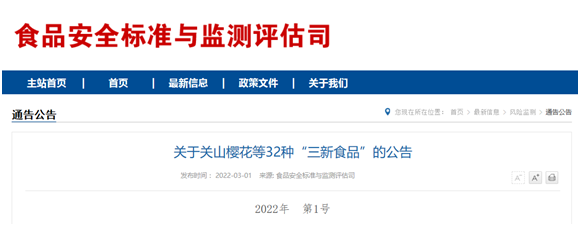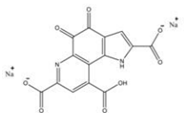
On 1st March, 2022, National Health Commission of the People's Republic of China (NHC) approved 2 new food raw materials and 11 new food additives. The detailed approval information is as follow:
1. New food raw material
(1) Kanzan flower
Name | Kanzan flower |
Basic information | Species: Cerasus serrulate ‘Sekiyama’ Edible parts: flower The flowering period of collection is from more than 3/4 of the buds to full bloom. |
Other information | 1. The substance shall not be consumed by infants, pregnant women and lactating women. Inapplicable population should be marked on labels and instructions. 2. Food safety indexes are implemented in accordance with the relevant national regulations of other vegetables products. |
(2) Pyrroloquinoline quinone disodium(PQQ)salt
Name | Pyrroloquinoline quinone disodium(PQQ)salt | |
Basic information | CAS:122628-50-6 Molecular formula:C14H4N2Na2O8 Molecular weight:374.17 Structure: | |
Production process | Using 6-amino-5-methoxyindole-1H-2-carboxylic acid ethyl ester and dimethyl 2-oxoglutaconate as raw materials, after coupling reaction, formation of quinoline ring, oxidation reaction and hydrolysis reaction of ester and refining. | |
Recommended intake | ≤20 mg/d | |
Quality requirement | Property | Reddish brown powder |
Pyrroloquinoline quinone disodium(PQQ)salt content(on dry basis), g/100 g | ≥98.0 | |
Moisture, g/100 g | ≤12.0 | |
Other information | 1. Application scope and maximum usage: beverages (40 mg/ kg, solid beverages are converted according to the mass of liquid after preparation). 2. The substance shall not be consumed by infants, young children, pregnant women and lactating women. Inapplicable population should be marked on labels and instructions. 3. Pyrroloquinoline quinone disodium(PQQ)salt and the other two impurities’ test method check the link at the end of this article. 4. Food safety indicators must meet the following requirements: | |
Pb/(mg/kg) | ≤0.5 | |
As/(mg/kg) | ≤1.0 | |
Cd/(mg/kg) | ≤0.1 | |
Hg/(mg/kg) | ≤0.1 | |
3-chloro-4,5-dioxo-4,5-dihydro-1H-pyrrole[2,3-f]quinoline-2,7,9-tricarboxylic acid,g/100g | ≤0.8 | |
4-nitro-5-methoxy-1H -pyrrole [2,3-f] quinoline-2,7, 9-tricarboxylic acid,g/100g | ≤0.5 | |
2. New food additives
(1) New enzymes for food industry
No | Name | Source | Donor |
1 | Phospholipase A1 | Aspergillus oryzae | Valsaria rubricosa |
2 | Maltogenic amylase | Bacillus licheniformis | Geobacillus stearothermophilus |
3 | Glucose oxidase | Trichoderma reesei | Penicillium amagasakiense |
4 | Lipase | Trichoderma reesei | Aspergillus niger var. tubingensis |
The quality specification requirements of enzymes should meet the requirements of the ‘National Food Safety Standard, Food Additives, Enzymes’ (GB 1886.174).
(2) Food additives with expanded scope
No | Name | Function | Category number | Food name/category | Maximum level(g/kg) | Note |
1 | Silicon dioxide | Anti-caking agent | 04.04.03 | Other soy products(only for soy protein powder or modulated soy protein powder) | 15.0 | — |
2 | Carbon dioxide | Other | 01.02.02 | Flavored fermented milk | Appropriate level as required in production | — |
3 | Turmeric | Colorant | 06.03.02.04 | Batter(Such as batter containing fish and poultry), coating flour, powder used for food frying | 0.25 | Measured as curcumin |
4 | Nisin | Preservative | 04.04.01.03.02 | Pot-stewed semi-dried tofu | 0.5 | — |
5 | Sucralose | Sweetener | 04.04.01.05 | New soy products(puffed soy protein food, soybean meat, etc.) | 0.4 | — |
6 | Vegetable carbon black | Colorant | 01.02.02 | Flavored fermented milk | 5.0 | — |
04.01.02.05 | Jam |
(3) Processing aids with expanded scope
No | Name | Function | Usage scope |
1 | White mineral oil | Release agent, lubricating agent | Processing technology of fresh yeast products (The maximum level is 0.1 g /kg) |
If you have any needs or questions, please contact us at service@cirs-group.com.
Reference:


